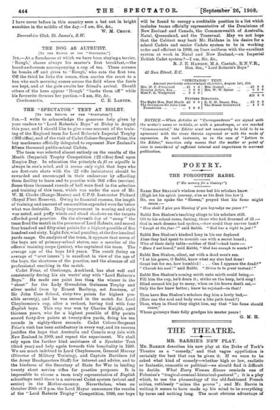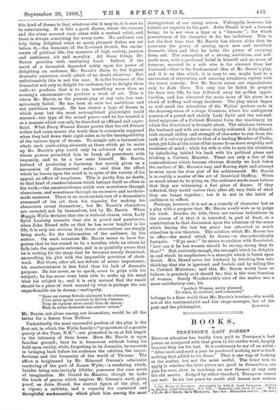THE THEATRE.
•
MR. BARRIE'S NEW PLAY.
Mn. BARBIE describes his new play at the Duke of York's Theatre as a "comedy," and that vague appellation is certainly the best that can be given it. If we were to be asked what kind of comedy—whether high or low, realistic or fantastic, romantic or political—we should find it difficult to decide. What Every Woman Snows reminds one of Polonius's ".tragical-comical-historical-pastoral " ; it is a play which, to use the phraseology of the old-fashioned French critics, ruthlessly " mixes the genres" ; and Mr. Barrie in writing it seems to have made up his mind to be everything by turns and nothing long. The most obvious advantage of
this kind of drama is that, whatever else it may be, it is sure to be entertaining. It is like a good dinner, where the courses and the wines succeed each other with a mutual relish, and there is always something for every taste. No audience can help being delighted when so many pleasant dishes are set before it,—the humours of the Lowland Scotch, the excite- ments of political life, the manners of high society, passion and sentiment, wit and morality. All these things Mr.
Barrie provides with unstinting hand. Indeed, if the merit of a dramatist depended solely upon his power of delighting an audience, Mr. Barrie's claim to the highest dramatic eminence could admit of no doubt whatever. But unfortunately this is not the case. It is the business of the dramatist not only to delight his audience, but to delight them well—to produce, that is to say, something more than an evening's amusement—to produce a work of art. This is where Mr. Barrie, in the present play at any rate, has con- spicuously failed. He has been at once too ambitious and not ambitious enough. He has chosen a type of drama in which none but the most accomplished playwright could succeed—the type of the mixed genre—and he has treated it in a manner which can only be described as offhand and super- ficial. 'What Every Woman Knows proves that the old French critics had come nearer the truth than is commonly supposed when they laid down their rigid rules as to the incompatibility of the various types of drama. To mingle into a harmonious whole such contrasting elements as those which go to make up Mr. Barrie's play could only be achieved by an artist whose powers permitted him to break all precedents with impunity, and to be a law unto himself. Mr. Barrie, instead of producing a harmony, has merely given us a succession of disconnected notes ; and thus the effect which he leaves upon the mind is, in spite of the variety of his
appeal, an effect of emptiness. This is partly due, no doubt, to that kind of amateurishness which betrays itself so often in
his work,—the amateurishness which errs sometimes through clumsiness, and sometimes through an excessive and machine- made neatness. There is no more certain test of a dramatist's command of his art than his capacity for making his characters reveal themselves ; but Mr. Barrie's characters are revealed, not by themselves, but by Mr. Barrie. When Maggie Wylie declares that she is without charm, when Lady Sybil Lazenby remarks that she is proud and passionate, when John Shand tells us that he has never laughed in his life, it is only too obvious that these observations are simply being made, for the information of the audience, by the author. On such occasions Mr. Barrie seems to have for- gotten that he has ceased to be a novelist, while on others he falls into the opposite extreme, and is so painfully aware that he is writing for the stage that he becomes merely theatrical, unravelling his plot with the impossible precision of clock- work. But these, after all, are defects of minor importance ; his amateurishness is less fatal than his lack of dramatic purpose. He has never, so to speak, come to grips with his subject ; he has never even been able to make up his mind what his subject is ; and it is only natural that the result should be a piece of work marred by what is perhaps the one unpardonable sin in drama,—ambiguity.
"Dana nn roman frivole aisement tout s'excuse; C'est assez qu'en courant la fiction s'amuse. Trop de rigueur alors serait hors de saison : Mais la scene demande uno exacte raison."
Mr. Barrie, not alone among our dramatists, would be all the better for a lesson from Boileau.
Undoubtedly the most successful portion of the play is the first act, in which the Wylie family—" proprietors of a granite quarry at the Pans, N.B."—are presented to us at full length in the intimacy of their home. Here Mr. Barrie is upon familiar ground ; here he is humorous without losing his bold upon reality, while, forgetting to be dramatic, he succeeds in bringing back before his audience the oddities, the imper- fections, and the humanity of the world of Thrums. The effect is heightened by Mr. Edmund Gwenn's admirable rendering of the part of James Wylie,—a rendering which, besides being convincingly lifelike, possesses the rare merit of imagination: Mr. Gerald du Maurier, though he lacks
the touch of genius which inspires Mr. Gwenn's work, gives proof, as John Shand, the central figure of the play, of a vigour, a. subtlety, and a capacity for sustained and
thoughtful workmanship which place him among the most distinguished of our rising actors. Unhappily, however, his talents are superior to his part. John Shand is not a human being; he is not even a type or a " humour " ; the whole presentment of his character is far too indistinct. This is not the first time that Mr. Barrie has shown alike that he possesses the power of seizing upon new and excellent dramatic ideas and that he lacks the power of carrying them out. The conception of a strong, ambitious, and self- made man, with a profound belief in himself and no sense of humour, married to a wife who is far cleverer than her husband,—that is the fundamental idea of Mr. Barrie's play, and it is an idea which, it is easy to see, might lead to a succession of interesting and amusing situations, replete with the truest comedy. But Mr. Barrie raises our expectations only to dash them. Not only has he failed to project his hero into life, he has frittered away his golden oppor- tunities, and has obscured the main issue of his piece in a cloud of trifling and stagy incidents. The play which began so well amid the actualities of the Wylies' parlour ends in the drawing-room of a stage Countess, where the ambiguous passion of a proud and stately Lady Sybil and the cut-and- dried epigrams of a Cabinet Minister form the machinery by which the d,Cnoil meat is brought about. The relations between the husband and wife are never clearly indicated. John Shand, with enough ability and strength of character to rise from the rank of a railway porter to that of a leading Member of Parlia- ment, yet fails at the crisis of his career from sheer stupidity and weakness of mind ; while his wife is able to save the situation by interfering behind his back with his political plans and tricking a Cabinet Minister. These are only a few of the contradictions which become obvious directly we look below the surface of Mr. Barrie's easy and flowing style and attempt to seize upon the true gist of his achievenient. Mr. Barrie is in reality a master of the art of theatrical bluffing. When so much seems to be going on, the audience needs must believe that they are witnessing a fine piece of drama. If they reflected, they would realise that, after all, very little of what they see hangs together ; but it is not in the habit of audiences to reflect.
Perhaps, however, it is not as a comedy of character but as a play with a purpose that Mr. Barrie would wish us to judge his work. Besides its title, there are various indications in the course of it that it is intended, in part arleast, as a contribution to that discussion upon the relations of the sexes which during the . last ten years has attracted so much attention in our theatres. The solution which Mr. Barrie has to offer—the moral which he draws—is characteristically fantastic. "O ye men!" he seems to exclaim with Zorobabel, " how can it be but women should be strong, seeing they do thus ? " But, curiously enough, the strength which he delights in and which he emphasises is a strength which is based upon deceit. Mrs. Shand saves her husband by deluding him into thinking that she is ignorant and foolish, and by telling fibs
to Cabinet Ministers ; and this, Mr. Barrie would have us believe, is precisely as it should be; this is the true function of woman. Surely Wordsworth's view of the matter was a more satisfactory one; his
"perfect Woman, nobly planned To warn, to comfort, and command,"
belongs to a finer world than Mr. Barrie's heroine,—the world, not of the sentimentalist and the stage-manager, but of the











































 Previous page
Previous page